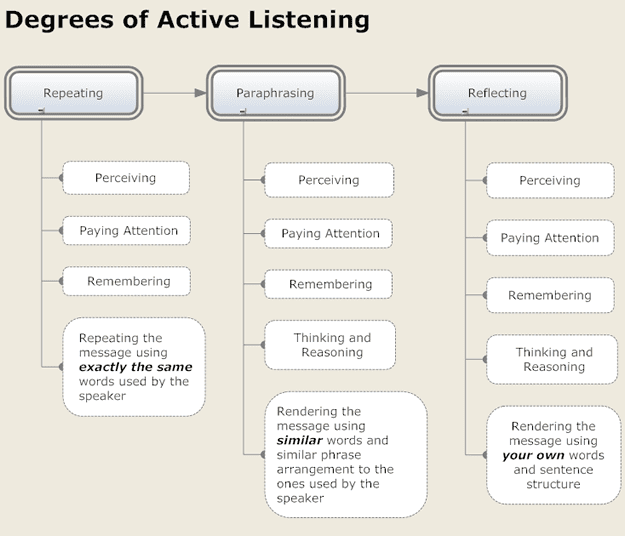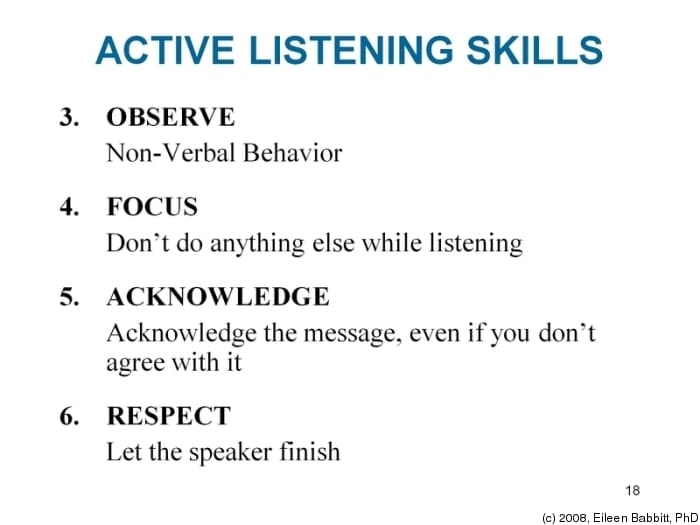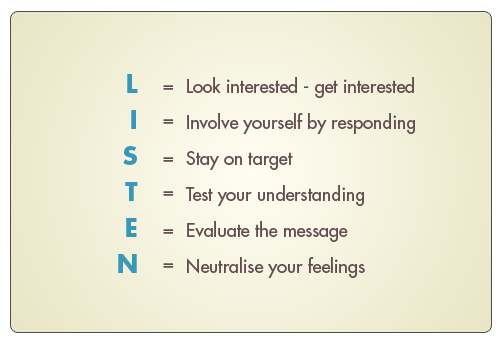What to Do When a Teenager Will Not Listen
Livingsta is a writer who focuses on anything that fascinates, provokes or interests her. She always puts forth her best efforts and focus.
Active listening is defined as "A communication technique where a listener has to feedback to the speaker what they have heard, by paraphrasing in their own words, to confirm understanding of both parties." (Wikipedia)
It is hearing very carefully to what people are saying. It is listening to what they are saying clearly and word by word. Listening skills are very important in all walks of life and in every relationship. Be it job or personal, active listening is very important to improve your performance at work and to build the quality of relationships with others.

The Active Listening Chart
By Creator: Imelda Bickham (Own work) [CC-BY-SA-3.0 (http://creativecommons.org/licenses/by-sa/3.0)
Hearing and listening are entirely different. Hearing is just sound that falls on our eardrums. It can be any noise or sound, but we do not have any control over it, whereas listening is an active process where we bring a meaning out of the process.
Why Do We Listen?
We all listen for various reasons. Every time we listen to something or someone we take in information. This is done to obtain more information or learn new things or to understand things better or to correct errors or to practise or just for entertainment or to show that we care.
Research shows that most people who hear things remember only between 25 to 50 percent of what they actually hear. This shows that we are losing more than half the information. There are high risks when you are hearing important information and more than half the information you forget might be the important information, which is a highly risky thing to do. So hearing alone is not beneficial, one needs to listen actively with care. This will help one to be a productive person and avoid conflicts. This also helps one to negotiate and makes the workplace a success.

How to listen actively?
tufts.edu
How to Listen Actively
Active listening comes with practice. One needs to make all efforts to not just hear, but understand the complete message the other person is trying to convey and this can be achieved only by listening very carefully. One should not be distracted by anything happening around or lose focus just because, the subject that you are listening to, does not seem interesting. You are there to listen to what the speaker talks and help them. You need to train yourself to listen, whatever the subject is. Also do not argue or catch up with any arguments and moreover with the sole intention of stopping the other person from talking. This will give the impression that you are not focused or rather that you do not wish to focus and will lead to misunderstandings.
Acknowledge that you are listening by nodding your head or by saying "uh-huh". We need to put ourselves into the situation of the speaker to see if we would wish to continue speaking when no one is listening. Nobody will want to do that and so we should not be treating others that way either. By acknowledging the speaker, you encourage them to speak and in return, you get all the information that you require. Also asking for clarification and asking questions where necessary to gain more information, will give the speaker the impression that you are listening to them.

faculty.londondeanery.ac.uk
How to Become an Active Listener
One needs to hear clearly what the person is speaking and the speaker needs to know that the listener is listening clearly to what they are talking keeping aside all thoughts. Not listening to people is not a good habit and it needs to be broken. Active listening comes with practice, patience, concentration, determination and perseverance. Initially one needs to force themselves to listen, taking that as one of the goals to be achieved. Active listening is part of communication skills and is very important at work and in every relationship.
- Prepare yourself mentally before starting a conversation. Find a place where there is less distraction and stop all activities that you are involved in. For example, do not keep typing something or doing something else and do the listening too. It doesn't work. You will not have listened to even 1% of the important information and the speaker will feel ignored and not want to speak.
- Clear your mind of anything that you are doing or pre-occupied with, because that can lead to distraction and you will lose track during the conversation. And it is most important to keep away any emotional thoughts as this can have a serious impact on the conversation and any opinions or decisions you might provide.
- Always pay full attention to the speaker and acknowledge what they say. Pay close attention to their body language too, as body language tells a lot. It can give clues to the feelings and purpose behind the conversation. Keep good eye contact with the speaker at all times and do not let your mind wander away from where you are. If there are incidents happening around or people nearby talking, do not divert your mind into their conversations or incidents.
- Empathise with the speaker. Show them that you fully understand their feelings and that you can understand the depth of the situation, and how you understand the way it affects them, but it always does not mean that you agree to whatever the speaker is saying. Being an active listener, you can say phrases like, "you seem upset", "you seem frustrated", "is this the reason why you are angry?" etc
- Show that you are acknowledging by occasionally nodding your head and verbally saying "yes" or "uh-huh" to make sure you are concentrating on the discussion or talk and also to make sure that you are listening. Stay smiling and use positive facial expressions. Also maintain a positive body language, because this will make the speaker feel at ease and welcome and encourage them to speak without hesitation or fear. Use the words like, "great", "really?", "interesting". "well done", "go on" etc., as this will assure them that you are listening, interested and understanding what they say.
- Do not interrupt while the person is talking as it will create an impression that you are not willing to accept or agree to what they are talking, it will make the speaker angry, upset or irritated and they might think that you are not interested or willing to listen. If questions need to be asked, wait till the speaker finishes and then ask the questions, which require a lot of control and patience, especially when it is an argument or disagreement.
- Ask questions and repeat important facts to clarify and completely understand what they are talking about. Sometimes interpretation differs between people. So it is always important to clarify any doubts by asking questions or reflecting back using phrases like, "I understand that . . . " or "What I understand is . . . ?" or "So what you are saying is . . . " or "Am I right in understanding that . . . ?" Or "Is this what you meant . . . ?" or "What does this mean?", "This is what is heard . . . " etc. Accents and cultural behaviours can be difficult to understand or interpret, so it is always best to paraphrase. After every discussion or every part of the discussion, summarise the discussion or the idea. It is also good to finally summarise to confirm if that was what was discussed or decided.
- After completely listening, you need to give a response, which might be a decision or feedback or opinion. So while giving a response you need to be sensitive, honest and open. You need to positively respond to even negative situations and issues, respect the speaker and treat them the way you wish yourself to be treated. Think twice before saying anything so that you do not say anything wrong.
Benefits of Active Listening
- Active listening is used in almost all fields. For example counselling, social work, tutoring, journalism, management, public works, medical works, at home, and almost everywhere in every field.
- It makes the other people feel that they are important, respected, appreciated, cared for, worthy and also that their talks are meaningful, sensible, interesting and worth listening to.
- It makes relationships stronger, helps build trust and the ability to confide and feel confident.
- It helps us learn a lot and improve our knowledge in various fields that we might not have even thought of knowing about.
- It helps to socialise, get to know more about people, understand people better, helps improve communication and interpersonal skills and helps the people involved cope with emotional strains.
- It helps one move up the career ladder as listening skills are very important if you wish to progress in your career
- It helps to avoid negative things like misunderstandings and conflicts and helps build positive things like trust, care, understanding and knowledge.
- When it comes to business, it attracts customers.
Active Listening Plays a Very Important Role
Active listening plays a very important role in the customer services department. As a customer service representative or adviser one will get to meet, see, and talk face-to-face or over the phone with people from different cultures, people with different personalities and behaviours. People who speak the same language can have different accents depending on the geographical area or country. So active listening is what comes handy when dealing with the situations mentioned above.
This article is accurate and true to the best of the author's knowledge. Content is for informational or entertainment purposes only and does not substitute for personal counsel or professional advice in business, financial, legal, or technical matters.
Read More From Toughnickel
lorna on June 30, 2018:
describe the body language you use while someone is speaking to demonstrate active listening
Nawod chathuranga on May 30, 2018:
I am thank for your this information. Because my asiment its very use full.
livingsta (author) from United Kingdom on February 02, 2013:
Hello Docmo, thank you for reading and sharing your experience. True, in positions like these that require active listening, if one fails, it can lead to disastrous effects. I am glad you liked it. Thank you for the vote. Have a good weekend!
livingsta (author) from United Kingdom on February 02, 2013:
Hello Paul, thank you for reading and sharing your thoughts. I do understand what you say. Talking over the telephone, we can interpret a few expressions and feelings of the speaker, but not all of it. It can be quite difficult at times. Thank you for the vote and share. Have a good weekend!
Mohan Kumar from UK on February 02, 2013:
This is outstanding. I have been tutoring on a medical consultation skills masterclass and have emphasised the relevance of active listening in the Doctor patient encounter. It is amazing how many consultations end badly due to assumptions, unwillingness to listen and compulsive explaining. Thanks for a brilliant summary - I will use this! Voted up.
Paul Richard Kuehn from Udorn City, Thailand on February 01, 2013:
livingsta,
This is a great and also very useful hub on the hows, whys, and benefits of active listening. They are all so very true for effective communication. When I worked for the government, I transcribed and translated a lot of recorded foreign language conversations. This was really challenging, especially not being able to see the speakers body language while they were talking. In this situation, it was so important to be able to predict what the speakers would be saying. Voted up and sharing.
deergha from ...... a place beyond now and beyond here !!! on February 01, 2013:
Thank you dear...smiles, happiness and best wishes your way also...take care;-)
livingsta (author) from United Kingdom on February 01, 2013:
Thank you Deergha. It truly is a skill everyone needs to have. Thank you for the vote and share too! Have a lovely weekend :-)
deergha from ...... a place beyond now and beyond here !!! on February 01, 2013:
A very useful hub. The simple and very specific ways of presentation is really appreciated. Its very needed in case of all jobs where interaction with client is important which is always necessary in present work culture. Voted up useful and interesting. Sharing ass well.
What to Do When a Teenager Will Not Listen
Source: https://toughnickel.com/business/Active-Listening-What-How-and-Why
0 Response to "What to Do When a Teenager Will Not Listen"
Post a Comment